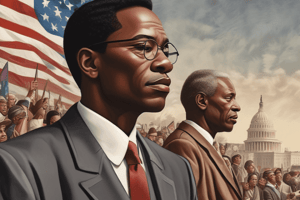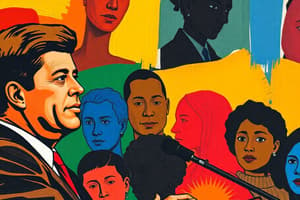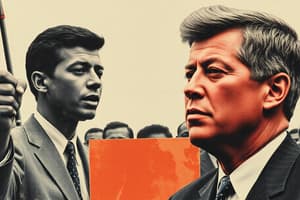Podcast
Questions and Answers
What was the primary theme of Martin Luther King’s “I Have a Dream” speech?
What was the primary theme of Martin Luther King’s “I Have a Dream” speech?
- Unity among all races
- Economic equality for all citizens
- Political independence for African Americans
- Judgment based on character, not skin color (correct)
What tragic event occurred shortly after President Kennedy's television address?
What tragic event occurred shortly after President Kennedy's television address?
- The shooting of Medgar Evers (correct)
- The march on Washington
- The Birmingham church bombing
- The assassination of Martin Luther King
Which of the following best describes the atmosphere in America following Kennedy's assassination?
Which of the following best describes the atmosphere in America following Kennedy's assassination?
- Indifference towards political issues
- Heightened tensions among political parties
- A deep sorrow and mourning (correct)
- A sense of joy and celebration
Which aspect of Kennedy's presidency is mentioned as having lasting impact despite controversies?
Which aspect of Kennedy's presidency is mentioned as having lasting impact despite controversies?
What was the immediate consequence of the assassination of Lee Harvey Oswald?
What was the immediate consequence of the assassination of Lee Harvey Oswald?
What tragic incident occurred involving a church in Birmingham in September 1963?
What tragic incident occurred involving a church in Birmingham in September 1963?
Who took over the presidency immediately after Kennedy was assassinated?
Who took over the presidency immediately after Kennedy was assassinated?
What was suggested about President Kennedy's popularity after his assassination?
What was suggested about President Kennedy's popularity after his assassination?
What was the primary strategy of the civil rights movement discussed in this content?
What was the primary strategy of the civil rights movement discussed in this content?
What significant event occurred when James Meredith tried to enroll at the University of Mississippi?
What significant event occurred when James Meredith tried to enroll at the University of Mississippi?
What was one reason for Kennedy's cautious approach to civil rights legislation?
What was one reason for Kennedy's cautious approach to civil rights legislation?
How did Martin Luther King, Jr. describe the campaign in Birmingham, Alabama?
How did Martin Luther King, Jr. describe the campaign in Birmingham, Alabama?
What was the primary goal of the Freedom Riders?
What was the primary goal of the Freedom Riders?
What type of violent responses did peaceful civil rights marchers face in Birmingham?
What type of violent responses did peaceful civil rights marchers face in Birmingham?
What action did President Kennedy take after witnessing the violence in Birmingham?
What action did President Kennedy take after witnessing the violence in Birmingham?
What incident prompted the Kennedy administration to involve federal marshals with the Freedom Riders?
What incident prompted the Kennedy administration to involve federal marshals with the Freedom Riders?
How did Robert Kennedy express his concerns about Martin Luther King, Jr.'s advisers?
How did Robert Kennedy express his concerns about Martin Luther King, Jr.'s advisers?
What was the purpose of the March on Washington led by Martin Luther King, Jr. in August 1963?
What was the purpose of the March on Washington led by Martin Luther King, Jr. in August 1963?
What did Kennedy compare the principle of civil rights to in his televised speech?
What did Kennedy compare the principle of civil rights to in his televised speech?
What was the Voter Education Project?
What was the Voter Education Project?
What significant event occurred in the Freedom Ride campaign near Anniston, Alabama?
What significant event occurred in the Freedom Ride campaign near Anniston, Alabama?
What was a consequence of the violent opposition encountered during the civil rights movement?
What was a consequence of the violent opposition encountered during the civil rights movement?
What was Kennedy's initial political strategy regarding civil rights?
What was Kennedy's initial political strategy regarding civil rights?
What role did private foundations play in the civil rights movement under Kennedy's encouragement?
What role did private foundations play in the civil rights movement under Kennedy's encouragement?
Flashcards
Freedom Riders
Freedom Riders
Organized, racially mixed groups who rode buses through the South to challenge segregation, starting in 1961. They aimed to draw attention to racism and involved both northern youth and southern activists, boosting the civil rights movement.
Voter Education Project
Voter Education Project
The effort by SNCC and other civil rights groups to register Black voters in the historically disenfranchised South.
Kennedy's Cautious Approach to Civil Rights
Kennedy's Cautious Approach to Civil Rights
Kennedy's initial hesitation to actively push for civil rights legislation due to his reliance on southern legislators for support of his economic and social policies.
Events that Shifted Kennedy's Stance
Events that Shifted Kennedy's Stance
Signup and view all the flashcards
Kennedy Administration and Civil Rights Movement Partnership
Kennedy Administration and Civil Rights Movement Partnership
Signup and view all the flashcards
Wiretapping of Martin Luther King Jr.
Wiretapping of Martin Luther King Jr.
Signup and view all the flashcards
King's Relationship with the Kennedys
King's Relationship with the Kennedys
Signup and view all the flashcards
Kennedy's Indirect Approach to Civil Rights
Kennedy's Indirect Approach to Civil Rights
Signup and view all the flashcards
Grassroots Empowerment Strategy
Grassroots Empowerment Strategy
Signup and view all the flashcards
The Meredith Incident
The Meredith Incident
Signup and view all the flashcards
Federal Intervention at Ole Miss
Federal Intervention at Ole Miss
Signup and view all the flashcards
Birmingham: City of Segregation
Birmingham: City of Segregation
Signup and view all the flashcards
Birmingham Brutality
Birmingham Brutality
Signup and view all the flashcards
Kennedy's Moral Issue Speech
Kennedy's Moral Issue Speech
Signup and view all the flashcards
The March on Washington
The March on Washington
Signup and view all the flashcards
Kennedy's Commitment to Civil Rights
Kennedy's Commitment to Civil Rights
Signup and view all the flashcards
I Have a Dream Speech
I Have a Dream Speech
Signup and view all the flashcards
Assassination of JFK
Assassination of JFK
Signup and view all the flashcards
Lee Harvey Oswald
Lee Harvey Oswald
Signup and view all the flashcards
Aftermath of JFK's Assassination
Aftermath of JFK's Assassination
Signup and view all the flashcards
Warren Commission
Warren Commission
Signup and view all the flashcards
Kennedy's Legacy After Assassination
Kennedy's Legacy After Assassination
Signup and view all the flashcards
Kennedy's Controversial Legacy
Kennedy's Controversial Legacy
Signup and view all the flashcards
National Unity After JFK's Assassination
National Unity After JFK's Assassination
Signup and view all the flashcards
Study Notes
Kennedy's Civil Rights Policies
- Kennedy initially approached civil rights cautiously, needing Southern support for other legislation.
- He believed broader social measures would eventually benefit Black Americans.
- Events like the Freedom Rides (1960s) forced a shift in Kennedy's stance.
- Southern violence against Freedom Riders led to federal intervention to protect them.
- The Kennedy administration began working more actively with the Civil Rights Movement.
FBI Surveillance of King
- Fearing communist ties within King's advisors, Robert Kennedy ordered FBI wiretaps on King in 1963.
- relationship between King and the Kennedy's was generally positive despite these concerns.
Voter Registration Efforts
- The Voter Education Project, encouraged by Robert Kennedy, aimed to register disenfranchised Black voters in the South.
- This project was a key strategy to empower Black people through voting rights.
- The project sought to counteract racial discrimination at the grassroots level by empowering voters.
Desegregation of Schools
- The University of Mississippi's integration (1962) required federal intervention, with 400 marshals and 3000 troops.
- This highlighted the obstacles to desegregation in the South.
- Southern universities had different levels of resistance to desegregation.
Birmingham Campaign
- King's Birmingham campaign (1963) faced intense opposition and violence including police brutality (attack dogs, water hoses, etc)..
- The campaign created significant negative media coverage and international pressure that raised awareness and fueled the demand for Civil Rights legislation.
Kennedy's 1963 Address
- Kennedy's June 1963 speech addressed the civil rights crisis as a moral issue.
- He pledged support for legislation to protect Black citizens.
- He emphasized the principles of the American Constitution.
Assassination of President Kennedy
- President Kennedy was assassinated on November 22, 1963, in Dallas.
- Lee Harvey Oswald was identified as the assassin but was himself shot by Jack Ruby.
- An official investigation was launched to get to the bottom of the assassination.
Studying That Suits You
Use AI to generate personalized quizzes and flashcards to suit your learning preferences.
Related Documents
Description
Test your knowledge on President Kennedy's approach to civil rights, including his initial caution, response to events like the Freedom Rides, and the fight for voter registration. Explore the dynamics between his administration and the Civil Rights Movement, as well as the FBI's surveillance of Martin Luther King Jr.




